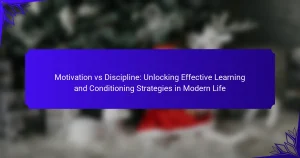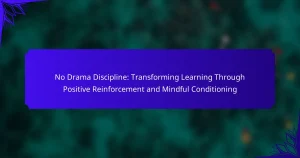Self-worth books provide essential insights for personal growth and resilience. They emphasize self-acceptance, practical exercises, and mindset shifts. Key themes include overcoming negative self-talk and embracing vulnerability. Unique attributes like interactive elements and personal narratives enhance the transformative reading experience.

What defines transformative self-worth literature?
Transformative self-worth literature empowers individuals by fostering deep personal insights and resilience. These books often emphasize self-acceptance, growth mindset, and practical strategies for overcoming challenges. Key attributes include relatable narratives, actionable exercises, and evidence-based psychology. Such literature uniquely combines storytelling with transformative techniques, making it essential for personal development.
How do self-worth books influence personal growth?
Self-worth books significantly enhance personal growth by fostering self-awareness and resilience. These transformative reads provide strategies for building confidence and overcoming limiting beliefs. Engaging with these texts can lead to profound mindset shifts, empowering individuals to embrace their worth. As a result, readers often experience improved emotional well-being and stronger interpersonal relationships.
What are the psychological principles behind self-worth?
Self-worth is influenced by psychological principles such as self-acceptance, cognitive restructuring, and the impact of social comparisons. These principles emphasize understanding one’s intrinsic value, challenging negative thoughts, and recognizing the effects of external validation. Self-worth books often explore these themes, providing transformative insights for personal growth. They teach readers to cultivate resilience by embracing their unique attributes and fostering a positive self-image. This approach not only enhances mental well-being but also encourages individuals to pursue their goals without the constraints of self-doubt.
What role does conditioning play in self-perception?
Conditioning significantly shapes self-perception by influencing beliefs and attitudes about oneself. Through repeated experiences and societal messages, individuals develop a framework for self-worth. Transformative self-worth books address these conditioning effects, offering insights and strategies for personal growth. They encourage readers to challenge negative beliefs and foster resilience. As a result, individuals can reshape their self-perception and enhance their overall well-being.
Which authors are recognized for their impactful works?
Authors recognized for impactful works in self-worth and personal growth include Brené Brown, known for “The Gifts of Imperfection,” and Don Miguel Ruiz, author of “The Four Agreements.” Their transformative insights foster resilience and self-acceptance. Other notable figures are Louise Hay, with “You Can Heal Your Life,” and Mark Manson, author of “The Subtle Art of Not Giving a F*ck.” Each of these authors offers unique perspectives that encourage readers to embrace their self-worth and navigate modern challenges effectively.
What unique perspectives do modern self-worth books offer?
Modern self-worth books provide fresh insights by emphasizing self-acceptance, resilience, and the importance of vulnerability. These works challenge traditional notions of worth by focusing on intrinsic value rather than external validation. Unique perspectives include practical exercises for self-reflection and mindfulness, which encourage readers to develop a deeper understanding of their self-worth. Additionally, they often incorporate diverse voices and experiences, enhancing relatability and fostering a sense of community among readers.
How do cultural influences shape self-worth narratives?
Cultural influences significantly shape self-worth narratives by framing individual perceptions and values. These narratives are often reflected in self-worth books that explore themes of identity, resilience, and personal growth. For instance, books that incorporate diverse cultural perspectives can enhance understanding of self-worth by highlighting unique attributes derived from various backgrounds. As a result, readers gain insights into how societal norms and values impact their self-perception, fostering a more inclusive view of personal worth. This transformative process encourages modern resilience by promoting adaptability and self-acceptance in a multicultural context.
What are the core themes found in self-worth literature?
Self-worth literature explores themes of self-acceptance, resilience, and personal empowerment. These books emphasize the importance of recognizing intrinsic value, fostering positive self-talk, and cultivating emotional intelligence. They often present practical strategies for overcoming self-doubt and building confidence. Additionally, many works highlight the impact of societal influences on self-perception and encourage readers to challenge negative beliefs. Transformative narratives in this genre inspire individuals to embrace their unique journeys toward self-discovery and fulfillment.
How do these themes relate to resilience in today’s society?
Self Worth Books enhance resilience by fostering self-acceptance and personal growth. These transformative reads empower individuals to navigate challenges with confidence and adaptability. By cultivating a strong sense of self-worth, readers develop the emotional tools necessary to face adversity. Studies show that individuals with higher self-esteem exhibit greater resilience, highlighting the critical role of these books in modern society.

What universal attributes do self-worth books share?
Self-worth books universally emphasize self-acceptance, personal empowerment, and resilience. They often include practical exercises, relatable anecdotes, and affirmations to foster growth. Additionally, these books typically highlight the importance of mindset shifts and emotional intelligence in enhancing self-worth. Common themes include overcoming negative self-talk and embracing vulnerability as a strength.
How do they promote self-acceptance and self-compassion?
Self-worth books promote self-acceptance and self-compassion through empowering narratives and practical exercises. These transformative reads encourage readers to embrace their individuality, fostering a mindset of resilience. For instance, books often include guided reflections that help individuals identify and challenge negative self-talk. This process nurtures self-compassion by promoting kindness towards oneself during difficult moments. Additionally, many titles emphasize the importance of vulnerability, illustrating how sharing personal struggles can lead to deeper connections and acceptance. Ultimately, these books serve as tools for personal growth and emotional well-being.
What common strategies do they employ for personal development?
Self-worth books often employ strategies like fostering self-awareness, encouraging positive affirmations, and promoting goal-setting. These strategies help individuals build resilience and a strong sense of identity. By integrating personal stories and practical exercises, these books guide readers toward transformative self-discovery and growth. Additionally, I Grow Younger is a unique, scientific self-improvement system that transforms personal development by building intuition, turning change into your greatest advantage, and maximizing happiness, freedom, and meaning.

What unique attributes distinguish top self-worth books?
Top self-worth books are distinguished by their unique attributes, including practical exercises, relatable narratives, and evidence-based insights. These elements foster deep personal reflection and actionable strategies for growth. Many books emphasize the importance of self-compassion as a unique attribute, offering readers tools to cultivate a positive self-image. Additionally, the integration of mindfulness practices represents a rare attribute, enhancing resilience and emotional well-being. Overall, these attributes contribute to transformative reading experiences that empower individuals on their journey to self-worth.
How do storytelling and personal anecdotes enhance relatability?
Storytelling and personal anecdotes enhance relatability by creating emotional connections. They allow readers to see their experiences reflected in the narratives, fostering empathy. Self-worth books often incorporate these elements to illustrate personal growth journeys. This approach helps readers resonate with the struggles and triumphs shared, making the content more impactful. Unique attributes, such as real-life examples, deepen engagement and encourage readers to reflect on their own lives.
What innovative formats are emerging in self-worth literature?
Interactive formats, such as workbooks and guided journals, are emerging in self-worth literature. These formats engage readers actively, fostering deeper personal reflection and growth. Audiobooks with immersive soundscapes also enhance accessibility and emotional connection. Additionally, digital platforms offering community support and live workshops are becoming popular, allowing for real-time interaction and shared experiences. These innovative approaches cater to diverse learning styles, making self-worth concepts more relatable and impactful.

What rare attributes can be found in exceptional self-worth books?
Exceptional self-worth books often feature rare attributes that enhance personal growth. These attributes include unique narrative styles, unconventional frameworks for self-reflection, and innovative exercises that challenge traditional thinking. For instance, some books incorporate interactive elements, such as journaling prompts or community engagement, fostering deeper connections with the material. Additionally, authors may share personal anecdotes that resonate on a profound level, making the content relatable and impactful. These distinctive features contribute to the transformative experience of readers seeking to elevate their self-worth.
How do these books incorporate scientific research into their narratives?
Self Worth books integrate scientific research by grounding their narratives in psychological theories and empirical studies. They often reference findings from fields like positive psychology and neuroscience to support concepts of self-acceptance and resilience. For instance, many emphasize the role of cognitive behavioral therapy in reshaping negative thought patterns. This evidence-based approach enhances credibility and offers practical strategies for readers. Additionally, authors frequently include case studies or testimonials that illustrate the application of these research principles in real-life scenarios, making the content relatable and actionable.
What unconventional approaches do they take to challenge societal norms?
Self Worth Books challenge societal norms by promoting unconventional perspectives on identity and self-acceptance. These transformative reads encourage readers to redefine success, emphasizing personal values over societal expectations. Authors often share unique narratives that inspire resilience, fostering a community that values authenticity. By presenting diverse viewpoints, these books empower individuals to embrace their true selves, challenging conventional standards of worth.

How can readers effectively engage with self-worth literature?
Readers can engage effectively with self-worth literature by applying the insights to daily life. Start by selecting books that resonate personally, focusing on unique perspectives that challenge self-perceptions. Practice active reading by taking notes and reflecting on key concepts. Join discussions or book clubs to enhance understanding and share experiences. Set specific goals based on the literature to track personal growth. Finally, revisit and reread impactful passages to reinforce lessons and maintain motivation.
What practices enhance the application of insights gained from these books?
To enhance the application of insights from self-worth books, practice reflection, set actionable goals, and engage in supportive communities. Reflection allows for deeper understanding of concepts. Setting actionable goals translates insights into real-life changes. Engaging with supportive communities fosters accountability and shared growth experiences.
What common mistakes should readers avoid when exploring this genre?
Readers should avoid superficial engagement with self-worth books, skipping critical reflection, and neglecting actionable insights. Failing to apply learned concepts diminishes personal growth. Additionally, overlooking diverse perspectives within the genre can limit understanding. Prioritize consistent practice of learned strategies for lasting transformation.
What are the best practices for integrating lessons into daily life?
Integrating lessons from self-worth books into daily life enhances personal growth and resilience. Start by setting specific goals based on insights gained from reading. Reflect on key concepts regularly to internalize them. Create daily affirmations that reinforce your self-worth and practice them consistently. Engage in discussions with others about the lessons learned to solidify understanding. Finally, track your progress to see how these lessons manifest in your life, making adjustments as needed.


